May 08, 2025
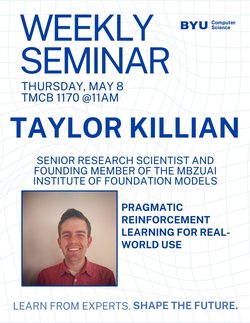
Title: “Pragmatic Reinforcement Learning for Real-World Use”
Abstract: In order to develop practical machine learning aided technology for the benefit of human users, it is critical to anchor scientific research and development by the intended real-world use cases. In this talk, I introduce specific modeling decisions that can be made to develop actionable insights from sequentially observed healthcare data as well as in the development of robust self-driving behaviors via large-scale self-play. By leveraging the inherent structure of the Reinforcement Learning paradigm, we effectively identify behaviors to avoid while also allowing for the development of emergent capabilities. Together, these advances serve to establish a strong foundation from which continued technological progress will be made, several directions that I will outline as a hopeful conclusion of my talk.
April 28, 2025
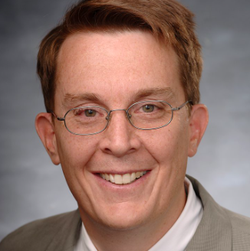
Abstract: Natural language processing (NLP) and Machine Learning (ML) more generally have the potential to break down linguistic barriers worldwide, yet millions who speak low-resource languages remain underserved by current technologies. Drawing on past collaboration with colleagues conducting basic research and applied science, I present key technical contributions in active learning (including cost-conscious annotation), topic modeling, and personalization systems that have influenced both theoretical understanding and real-world applications. Building on these foundations, I introduce an ambitious research agenda focused on machine translation for low-resource languages, a domain where current deep learning approaches fall short due to data scarcity. I will present a systematic multi-year plan exploring transfer learning, data augmentation, and cross-lingual modeling to address this grand challenge. This work not only promises significant contributions to NLP but also aligns with broader societal goals of democratizing access to information across linguistic barriers. The research vision combines technical innovation with a commitment to mentoring the next generation of computer scientists capable of tackling increasingly complex AI challenges. Bio: Eric Ringger is a Computer Scientist innovating in the fields of Natural Language Processing and Machine Learning. The through-line of my research and applied science work has been to empower and augment people -- customers, partners, scholars -- with great automation built on NLP, ML, and AI. The other dominant focus of my career is mentoring and growing people in their learning and impact. I am passionate about computer science and devoted to helping people realize their amazing potential. Most recently I was focused on enabling Zillow Group to use machine learning and AI -- including large language models -- to empower customers in finding and landing in a great home and to empower business partners with automation and intelligent support, all backed by the right automation and data. At Zillow Group I also built, led, and supported 1. the team that personalizes your search for and discovery of a place to live, 2. the team that understands your goals in the housing domain, 3. the team that personalizes Zillow's communications, 4. the team that builds the experimentation platform for controlled randomized experiments at scale for Zillow Group, and 5. the customer-focused product analytics team. I have contributed to progress in Search Ranking as a research scientist at Facebook and to the fields of Natural Language Processing and Text Mining as a professor at Brigham Young University, as a research scientist at Microsoft Research, and as a Ph.D. student at the University of Rochester.
April 07, 2025
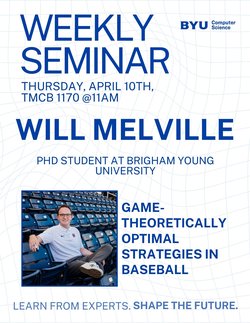
Details
Where: TMCB 1170
When: April 10th @ 11am
Speaker: Will Melville
Talk Title
Game-Theoretically Optimal Strategies in Baseball
Abstract
The purpose of our work is to define game-theoretically optimal strategies for every decision in a baseball game. We begin with a pitch sequencing model, which we use to define optimal swing decision strategies and pitch sequencing strategies. Next, we define a method to optimize fielder positioning against both static hitters who do not adapt their batted ball trajectories in response to the defense's positioning strategy and adaptable hitters who choose their batted ball trajectories in response to the defense's positioning strategy. Finally, we investigate managerial matchup decisions such as when to relieve a pitcher or pinch hit for a batter by modeling baseball as an extensive-form game. We define and evaluate five game playing algorithms, and we show that at least four of the algorithms could help actual baseball managers make winning decisions.
Biography
William Melville received his undergraduate degree in applied and computational mathematics (ACME) at BYU in 2020 before starting a job as an analyst with the Texas Rangers. He returned to BYU in 2022, where he is currently pursuing a PhD in computer science. His research focuses on applications of game theory to baseball strategy.
March 31, 2025
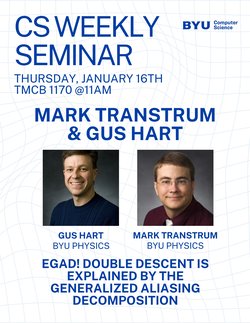
Details
Where: TMCB 1170
When: April 3rd
Speaker: Mark Transtrum & Gus Hart
Talk Title
eGAD! double descent is Explained by the Generalized Aliasing Decomposition
Abstract
A central problem in data science is to use potentially noisy samples of an unknown function to predict values for unseen inputs. Classically, predictive error is understood as a trade-off between bias and variance that balances model simplicity with its ability to fit complex functions. However, over-parameterized models exhibit counterintuitive behaviors, such as “double descent” in which models of increasing complexity exhibit decreasing generalization error. Other models may exhibit more complicated patterns of predictive error with multiple peaks and valleys. Neither double descent nor multiple descent phenomena are well explained by the bias–variance decomposition. I present the generalized aliasing decomposition (GAD) to explain the relationship between predictive performance and model complexity. The GAD decomposes the predictive error into three parts: 1.) model insufficiency, which dominates when the number of parameters is much smaller than the number of data points, 2.) data insufficiency, which dominates when the number of parameters is much greater than the number of data points, and 3.) generalized aliasing, which dominates between these two extremes. I apply the GAD to linear regression problems from machine learning and materials discovery to explain salient features of the generalization curves in the context of the data and model class.
Biography
Mark K. Transtrum received the Ph.D. degree in physics from Cornell University, Ithaca, NY, USA, in 2011. He then studied computational biology as a Postdoctoral Fellow from MD Anderson Cancer Center, Houston, TX, USA. Since 2013, he has been with Brigham Young University, Provo, UT, USA. He is currently an Associate Professor of physics and astronomy. His research works include representations of a variety of complex systems including power systems, systems biology, materials science, and neuroscience.
Gus Hart is a professor in the department of Physics and Astronomy. He came to BYU from Northern Arizona in 2006. He completed a PhD at UC Davis with Barry Klein in 1999 and a postdoctoral appointment at the National Renewable Energy Laboratory in 2001 with Alex Zunger.
Until 2022, Gus' research was computational materials physics where his focus was on alloy modeling, algorithm development, and aflowlib.org. He is the author of enumlib, symlib, and other open source codes. He is the primary developer of the commercial UNCLE cluster expansion code. Google scholar profile.
Since 2022, Gus' research focus has shifted to data science and computational biophysics, with a particular focus on developing AI for bacterial tomograms.
March 24, 2025
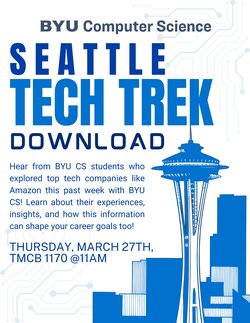
Details
Where: TMCB 1170
When: March 27th, @ 11 AM
Speakers: Student speakers
Abstract
Curious about what it’s like to network with industry leaders at companies like Amazon and Google? Join us for the Seattle Tech Trek Download, where BYU CS students will share their insights, key takeaways, and behind-the-scenes experiences from their trip. Whether you're looking for career advice, networking strategies, or just want to know what it’s like inside some of the world’s biggest tech companies, this is your chance to get the inside scoop! Don’t miss out on this opportunity to learn, ask questions, and get inspired for your own career journey.
March 13, 2025
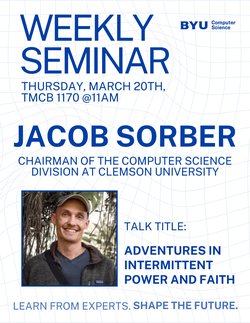
Details
Where: TMCB 1170
When: March 20th @ 11AM
Speaker: Jacob Sorber
Talk Title
Adventures in intermittent power and faith
Abstract
The Internet of Things has a battery problem. We simply can’t afford to recharge, replace, and dispose of trillions of batteries. Batteryless computing offers hope of a more sustainable future with devices that can be deployed maintenance-free for decades, but they are difficult to design, program, test, and deploy, due to frequent and unpredictable power failures. This talk will explore lessons learned from two decades of research on intermittently-powered systems and the transformative power of uncertainty and hope in the journeys of disciples and scholars.
Biography
Jacob Sorber is a Professor and Chair of the Computer Science Division of Clemson University’s School of Computing. His work makes mobile sensors and embedded systems more efficient, robust, deployable, and secure, by exploring novel systems (both hardware and software) and languages. His research has received support by the National Science Foundation (including a CAREER Award), the Dept. of Energy, the US Geological Survey, General Electric, and other sources. He works on problems in health, biology, agriculture, and manufacturing. Before joining Clemson, he was a postdoctoral researcher at Dartmouth College, a graduate student at UMass Amherst, and an undergraduate student at BYU.
Donuts will be served!
March 10, 2025
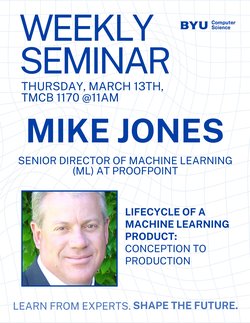
Details
Where: TMCB 1170
When: March 13th, 2025 @ 11:00 AM
Speaker: Mike Jones
Talk Title
Lifecycle of a Machine Learning Product: Conception to Production
Abstract
Building machine learning products that are both effective and scalable requires more than just model development—it’s about mastering the entire lifecycle, from conception to deployment. In this talk, we’ll break down the essential principles for creating successful ML systems, starting with a deep understanding of the business problem and how the product will provide real value to customers. We’ll discuss best practices, key trade-offs in system design, and how to balance the needs of software development with the demands of machine learning. Finally, we’ll explore how to monitor and maintain deployed systems to ensure they continue to evolve and meet business needs over time.
Join us to learn actionable strategies for building ML products that not only address immediate goals but also grow and scale, delivering lasting business value. For the future professionals in the audience, there will be a little career advice sprinkled throughout the talk as well.
Biography
Dr. Mike Jones is an experienced leader and innovator in the field of machine learning, with over 30 years of expertise spanning both academic and industry roles. He earned a B.S. in Computer Science from Brigham Young University and an M.S. and Ph.D. in Computer Science from the University of Colorado at Boulder. Currently serving as Senior Director of Machine Learning (ML) at Proofpoint, Mike oversees a team of data scientists and engineers developing AI-driven products across security, data protection, and compliance. Mike has built and led cutting-edge ML systems at organizations such as Symantec, FamilySearch, and Mobile Productivity, specializing in scalable data pipelines, generative AI, and large-scale machine learning applications. His work has had a significant impact across industries, from security to genealogy, and he has authored several research publications in machine learning and information retrieval. A passionate mentor, Mike fosters the professional development of his teams, shaping the next generation of ML leaders and driving innovative AI research and development initiatives.
February 27, 2025
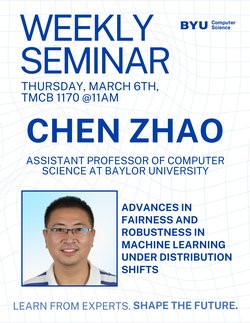
Details
When: March 6th @ 11am
Where: TMCB 1170
Speaker: Chen Zhao
Talk Title
Advances in Fairness and Robustness in Machine Learning Under Distribution Shifts
Abstract
In today's dynamic environments, machine learning models are increasingly deployed in contexts where data distributions evolve over time, posing significant challenges for both fairness and robustness. This talk explores cutting-edge methodologies designed to address these challenges, with a focus on supervised fairness-aware learning under distribution shifts. I will present novel frameworks that disentangle domain-specific and semantic information, enabling models to generalize across domains while maintaining fairness. Additionally, the discussion will highlight the impact of various types of distribution shifts—such as covariate, label, and concept shifts—on model performance and fairness. By leveraging fairness-aware optimization techniques, we aim to mitigate biases in dynamic data environments, ensuring ethical and equitable decision-making. The insights shared in this talk are drawn from both theoretical developments and empirical validations, underscoring the importance of fairness in machine learning in real-world applications, including hiring, healthcare, and financial services.
Biography
Dr. Chen Zhao is an Assistant Professor in the Department of Computer Science at Baylor University. Prior to joining Baylor, he was a senior R\&D computer vision engineer at Kitware Inc. He earned his Ph.D. degree in Computer Science from the University of Texas at Dallas in 2021. His research focuses on machine learning, data mining, and trustworthy AI, particularly fairness-aware machine learning, novelty detection, uncertainty quantification and domain generalization. His publications have been accepted and published in premier conferences, including KDD, CVPR, IJCAI, AAAI, WWW, etc. Dr. Zhao served as program committee members of top international conferences, such as KDD, NeurIPS, IJCAI, ICML, AAAI, ICLR, etc. He has organized and chaired multiple workshops on topics of Ethical AI, Uncertainty Quantification, Distribution Shifts, and Trustworthy AI for Healthcare at KDD (2022, 2023, 2024), AAAI (2023), and IEEE BigData (2024). He serves as the co-chair of the Challenge Cup of the IEEE Bigdata 2024 conference and tutorial co-chair for the Pacific-Asia Conference on Knowledge Discovery and Data Mining 2025.
February 24, 2025
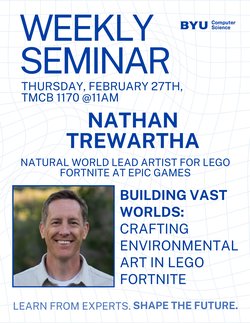
Details
Where: TMCB 1170
When: February 27th, 2025
Speaker: Nathan Trewartha
Talk Title
Building Vast Worlds: Crafting Environmental Art in Lego Fortnite
Abstract
At the intersection of creativity and gameplay, the art of environmental design plays a pivotal role in shaping immersive game experiences. This talk delves into the intricate process of crafting vast, dynamic worlds through the procedurally generated system that Lego Fortnite employs. Participants will explore the foundational principles of environmental art, from concept development to final execution, including the unique challenges and opportunities presented by this hybrid universe.
Attendees will gain insights into the artistic techniques used to create rich, engaging landscapes that reflect both the whimsical nature of Lego and the vibrant aesthetics of Fortnite. Key topics will include designing interactive spaces, utilizing color theory to evoke emotion, and balancing functionality with visual storytelling within a modular framework. The discussion will also touch on the collaborative efforts between artists, designers, and world builders and how these interactions influence the final player experience.
Join us for an inspiring session that not only showcases the beauty of environmental game art but also empowers creators to think beyond traditional boundaries, showcasing how creativity and problem solving can transform games into intriguing worlds. Whether you're an artist, a gamer, or a fan of both worlds, this talk promises to ignite your imagination and elevate your understanding of the complexities and challenges that go into creating art for games and how to solve some of those challenges.
Biography
Nathan Trewartha is an Art Lead at Epic Games, currently working on Lego Fortnite. With a lifelong passion for illustration, he spent his elementary and high school years drawing and painting—sometimes to the dismay of his teachers.
He pursued his artistic talents at Brigham Young University, earning a Bachelor of Fine Arts (BFA) in illustration, followed by a Master of Fine Arts (MFA) from Utah State University. His career in game development began at Glyphics, a Utah-based studio, where he created characters and contributed to a Green Army man game, gaining experience in texture mapping, animation, and lighting.
Trewartha later co-founded Chair Entertainment with a group of BYU friends, a venture that led to the studio’s acquisition by Epic Games during the production of Shadow Complex. Since joining Epic, he has worked on Shadow Complex, the Infinity Blade trilogy, and now leads artistic efforts on Lego Fortnite.
February 18, 2025
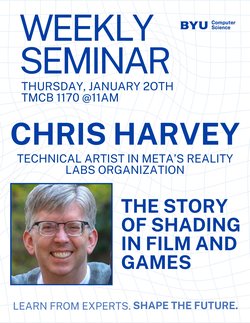
Details
When: February 20th, 2025 @ 11am
Where: TMCB 1170
Speaker: Chris Harvey
Talk Title
The story of shading in film and games
Abstract
Shading is a vital part of the process that brings compelling visuals to our movies and games, but what is it exactly and how as it evolved over the last 30 years. We’ll delve into the technology, past present and future. We’ll touch on how video games have evolved at a breakneck pace seeking ever more realistic visuals, and how this art continues to evolve to create ever more engaging imagery.
Biography
Chris Harvey is a technical artist in Meta’s Reality Labs organization. There he combines his technical and artistic talents to further Meta’s goals of building customizable avatars for users across the world. After graduating from BYU with a BFA in animation he spent the next 20 years working in visual effects, software development and animation. He as worked in both artistic and technical roles and believes that there is always more to learn.
February 06, 2025
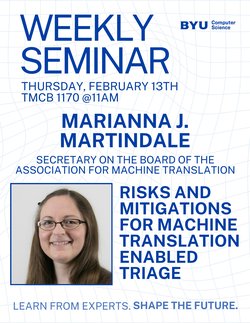
Details
Where: TMCB 1170
When: February 13th, 2025
Speaker: Marianna J. Martindale
Talk Title
Risks and Mitigations for Machine Translation Enabled Triage in Intelligence Analysis
Abstract
The perception of high Machine Translation (MT) quality, based largely on performance translating between high resource languages, has led to its adoption for a variety of use cases. However, MT is still imperfect and can even be misleading in its errors. Government use cases such as those involving law enforcement or intelligence are uniquely risky because government action or inaction based on incorrect information can cause harm to individuals or national security. One such use case is MT for triage in intelligence analysis. In this talk, I will first introduce the MT-enabled triage use case and some of the risks in the context of intelligence analysis as well as U.S. intelligence community policies implicated by this use case that may partially mitigate these risks. I will then present a user study with intelligence analysts to measure their baseline performance on this type of MT-enabled triage task and the effectiveness of providing additional translation outputs as a practical intervention to further mitigate risk.
Biography
Marianna J. Martindale received her PhD in Information Studies from the University of Maryland in August 2024 after previously receiving her BS in Computer science from BYU (2003) and MS in Linguistics (Computational) from Georgetown University (2010). Since 2003, she has worked for the US Government supporting, building, and deploying machine translation systems. She is currently serving as the secretary on the board of the Association for Machine Translation in the Americas. Her research interests include user-centered machine translation evaluation and how to help users calibrate their trust in generative AI model outputs.
February 03, 2025
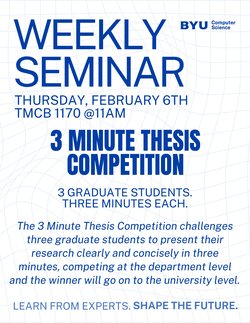
Details
In place of our weekly seminar, we will be hosting our annual 3MT competition. Three graduate students will have three minutes to present their thesis and the winner will go on to compete at the university level.
Where: TMCB 1170
When: 11am
January 24, 2025
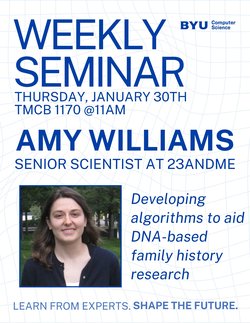
Details
When: January 30th, 2025
Where: TMCB 1170
Speaker: Amy Williams
January 22, 2025
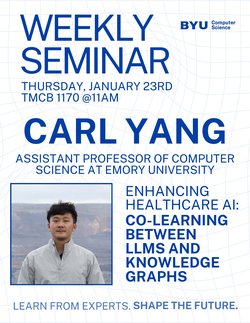
Details
When: January 23rd, 2025
Where: TMCB 1170
Speaker: Carl Yang
January 15, 2025
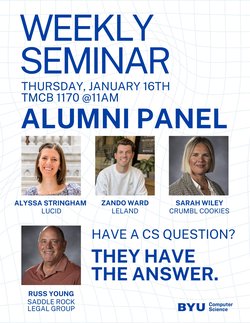
Details
When: Thursday, January 16th, 2025\
Where: TMCB 1170
Speaker(s): Alyssa Stringham, Zando Ward, Russ Young, Sarah Wiley
December 19, 2024

Luke 2:10-11, 13-14
And the angel said unto them, Fear not: for, behold I bring you good tidings of great joy, which shall be to all people. For unto you is born this day … a Saviour, which is Christ the Lord ... And suddenly there was with the angel a multitude of the heavenly host praising God, and saying, Glory to God in the highest, on earth peace, good will toward men.
Merry Christmas from our families to yours.
December 04, 2024
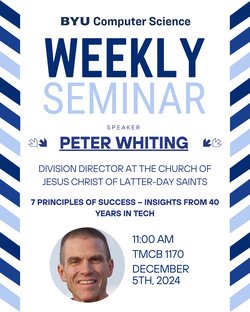
Where
TMCB 1170
When
December 5th, 2024
Talk Title
7 Principles of Success – Insights from 40 years in tech
Abstract
After nearly four decades in tech, I have learned lessons that go beyond writing code or managing systems. I have chosen seven of these lessons, expressed as principles, which I consider the most important not only to our careers but also to our lives. I will share stories and observations from the trenches -- both the wins and the face-palm moments -- that shaped these insights. My goal is to share these ideas in ways that will help you navigate your own professional and personal journeys.
Biography
Peter Whiting is the Church’s Chief Technology Officer and leads the Technology and Platform Services Division within the Church of Jesus Christ of Latter-day Saints. In these roles Peter defines the overarching technical direction of the Church and guides the teams responsible for the underlying technology used by the Church. Peter brings 35 years of diverse technical experience into this role: undersea signal processing, global internet network design and operation, and managed IT outsourcing. He is passionate about leveraging technology to improve the lives of those who live in under-resourced communities. Through extensive world travel, Peter has observed their challenges as well as their aptitudes. Accordingly, his technology interests are focused on enabling their success. Prior to working for the Church, Peter was Sprint’s Chief Technologist responsible for their internet business unit as the Internet transitioned from a government-controlled network to a commercial entity. Before that, he was a research scientist at IBM working on the US Navy’s undersea acoustic platforms. Peter earned a PhD from the University of Kansas in 2001. His dissertation dealt with applying the principles of machine learning and artificial intelligence to network protocol design.
November 18, 2024
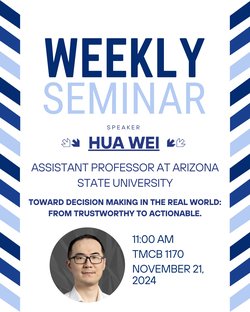
Details
November 21st
TMCB 1170 @ 11:00 AM
Talk Title
Toward Decision Making in the Real World: From Trustworthy to Actionable
Abstract
Reinforcement learning (RL) has achieved success in areas such as gaming, robotics, and language models, sparking curiosity about its applicability in the real world. When applying RL to real-world decision-making, challenges arise related to data and models. We will discuss the implications of these challenges on the feasibility of RL and share preliminary efforts to address them. These efforts include developing realistic simulators and bridging the gap between simulation and the real world through uncertainty quantification and the use of language models.
Biography
Hua Wei is an assistant professor at the School of Computing and Augmented Intelligence (SCAI) in Arizona State University (ASU). He got his PhD from Pennsylvania State University in 2020. He specializes in data mining, artificial intelligence and machine learning. He has been awarded the Best Paper at ECML-PKDD 2020, and his students and his own research work have been published in top conferences and journals in the fields of machine learning, artificial intelligence, data mining, and control (NeurlPS, AAAI, CVPR, KDD, IJCAI, ITSC, ECML-PKDD, WWW). His research has been funded by NSF, DoE and DoT.
November 07, 2024
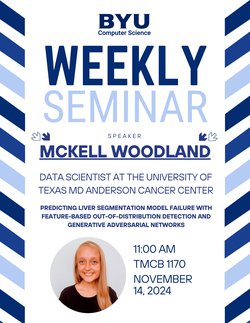
When: November 14th @ 11am
Where: TMCB 1170
Talk Title: Predicting Liver Segmentation Model Failure with Feature-Based Out-of-Distribution Detection and Generative Adversarial Networks
Advanced liver cancer is often treated with radiotherapy, which requires precise liver segmentation. While deep learning models excel at segmentation, they struggle on image attributes not seen during training. To ensure quality care for all patients, my research focuses on automated, scalable, and interpretable solutions for detecting liver segmentation model failures. In this talk, I will first present accurate and scalable solutions that utilize model features extracted at inference. I will then introduce generative modeling for the localization of novel information, an approach that integrates interpretability into the detection pipeline.
October 31, 2024
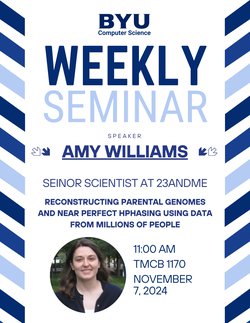
When: November 7th @ 11am
Where: TMCB 1170
Talk Title: Reconstructing parental genomes and near perfect hphasing using data from millions of people
The advent of large genotyped cohorts from genetic testing companies and biobanks have opened the door to a host of analyses and implicitly include data for massive numbers of relatives. Genetic relatives share identity-by-descent (IBD) segments they inherited from common ancestors and several methods have been developed to reconstruct ancestors’ DNA from relatives. We present HAPI-RECAP, a tool that reconstructs the DNA of parents from full siblings and their relatives. Given data for one parent, phasing alone with HAPI2 reconstructs large fractions of the missing parent’s DNA, between 77.6% and 99.97% among all families, and 90.3% on average in three- and four-child families. When reconstructing both parents, HAPI- RECAP infers between 33.2% and 96.6% of the parents’ genotypes, averaging 70.6% in four-child families. Reconstructed genotypes have average error rates < 10−3, comparable to those from direct genotyping. Besides relatives, massive genetic studies enable precise haplotype inference. We benchmarked state-of the-art methods on > 8 million diverse, research-consented 23andMe, Inc. customers and the UK Biobank (UKB), finding that both perform exceptionally well. Beagle’s median switch error rate (after excluding single SNP switches) in white British trios from UKB is 0.026% compared to 0.00% for European ancestry 23andMe research participants; 55.6% of European ancestry 23andMe participants have zero non-single SNP switches, compared to 42.4% of white British trios in UKB. SHAPEIT and Beagle excel at ‘intra-chromosomal’ phasing, but lack the ability to phase across chromosomes, motivating us to develop an inter-chromosomal phasing method called HAPTIC (HAPlotype TIling and Clustering), that assigns paternal and maternal variants discretely genome-wide. Our approach uses IBD segments to phase blocks of variants on different chromosomes. We ran HAPTIC on 1022 UKB trio children, yielding a median phase error of 0.08% in regions covered by IBD segments (33.5% of sites) and on 23andMe trio children, finding a median phase error of 0.92% in Europeans (93.8% of sites) and 0.09% in admixed Africans (92.7% of sites). HAPTIC’s precision depends heavily on data from relatives, so will increase as datasets grow larger and more diverse. HAPTIC and HAPI-RECAP enable analyses that require the parent-of-origin of variants, such as association studies and ancestry inference of untyped parents.
October 28, 2024
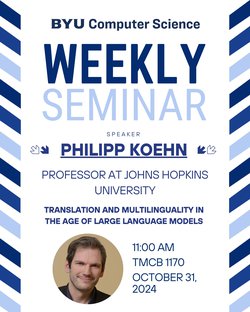
When: October 31st @ 11am
Where: TMCB 1170
Talk title: Translation and Multilinguality in the Age of Large Language Models
Abstract: We currently witness a convergence in the field of natural language processing into a unifying framework built on foundational language models. This talk traces the development of these models out of the interplay of translation and language model research. Large language models have fundamentally changed how machine translation systems are currently being built. The talk will highlight where these technologies stand, what new capabilities language models enable for translation, and what constitutes best practices when building machine translation systems for deployment. The talk will also show how language models currently struggle to work well inlanguages beyond English and what can be done to address this.
October 24, 2024
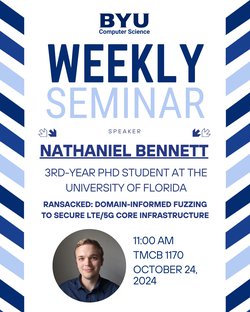
Where: TMCB 1170
When: October 24, 2024, 11am
Come meet Nathaniel Bennett, BYU CS grad and current PhD student at University of Florida!
October 23, 2024

Where: TMCB 1170
When: October 24th @ 11am
Talk title: RANsacked: Domain-Informed Fuzzing to Secure LTE/5G Core Infrastructure
Abstract: Cellular network infrastructure serves as the backbone of modern mobile wireless communication. As such, cellular cores must be proactively secured against external threats to ensure reliable service. Compromised base station attacks against the core are a rising threat to cellular networks, while user device inputs have long been considered as an attack vector; despite this, few techniques exist to comprehensively test RAN-Core interfaces against malicious input. In this talk, we'll explore the technique of fuzz testing and its more recent applications to network-connected applications. We'll then focus specifically on the domain of cellular networks and highlight some of the challenges with fuzzing cellular infrastructure that has hampered the application of current fuzzing approaches. Our research, which devises a fuzzing framework that performantly fuzzes cellular interfaces accessible from a base station or user device, overcomes several of these challenges in fuzzing LTE/5G network components. We also find our efforts in the cellular domain yield cross-domain applications. For instance, we develop and release a tool (ASNfuzzgen) that compiles arbitrary ASN.1 specifications into structure-aware fuzzing modules, thereby facilitating effective fuzzing exploration of protocols across cellular, automotive, space and industrial control systems. We evaluate our approaches against seven open-source and commercial cores and discover 119 vulnerabilities, with 93 CVEs assigned. Our results reveal common implementation mistakes across several cores that lead to vulnerabilities, and the successful coordination of patches for these vulnerabilities across several vendors demonstrates the practical impact ASNfuzzgen has on hardening cellular deployments.
October 16, 2024
When: October 17th @ 11am
Where: TMCB 1170
Talk Title: Towards Interactive, Robust, and Aligned AI Systems
We are in an age of “AI everywhere, all at once.” As AI systems become more prevalent in daily life it is increasingly important that their behavior is aligned with human intent and that these AI systems do what we actually want them to do, despite the fact that human intent is often nuanced and hard to formally specify. In this talk I will discuss recent progress towards using human input to enable interactive, robust, and aligned AI systems with a focus on three main topics: (1) how to enable AI systems to estimate human intent, (2) how to make AI systems that are calibrated and robust to uncertainty over human intent, and (3) how robots and other AI systems can efficiently query for additional human input to actively reduce uncertainty and improve their performance.
October 03, 2024
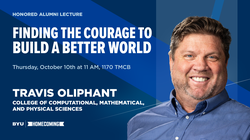
When: October 10th @ 11am
Where: TMCB 1170
Talk Title: Finding the Courage to Build a Better World
Travis E. Oliphant (BS ’95, MS ’96) is a luminary in the Python and AI communities. He started the SciPy project in 1999 as a student at the Mayo Clinic and built NumPy in 2005 while a professor in Electrical and Computer Engineering at BYU. These libraries have been adopted throughout the scientific and business world. His work enabled Python to become the number one computer language in the world and the foundation for modern AI.
September 26, 2024
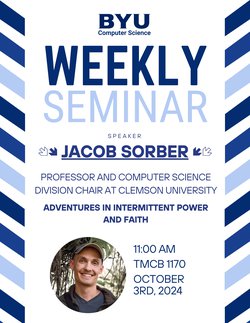
When: October 3rd @ 11am
Where: TMCB 1170
Talk Title: Adventures in intermittent power and faith
"The Internet of Things has a battery problem. We simply can’t afford to recharge, replace, and dispose of trillions of batteries. Batteryless computing offers hope of a more sustainable future with devices that can be deployed maintenance-free for decades, but they are difficult to design, program, test, and deploy, due to frequent and unpredictable power failures. This talk will explore lessons learned from two decades of research on intermittently-powered systems and the transformative power of uncertainty and hope in the journeys of disciples and scholars."
September 19, 2024
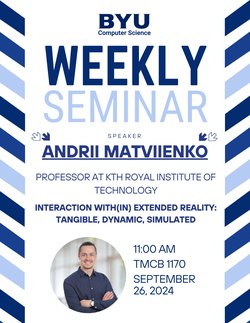
When: September 26th @ 11am
Where: TMCB 1170
Talk Title: Interaction with(in) Extended Reality: Tangible, Dynamic, Simulated
Extended Reality (XR), which is an umbrella term for Augmented Reality (AR), Virtual Reality (VR), and Mixed Reality (MR), is poised to introduce new ways of interacting with people, education, entertainment, and training by employing new technological solutions. While many applications are focused on individual, indoor, and visual-auditory interactions for work and home entertainment, interactions outside living rooms, multimodal aspects, and simulations have a long way to go. In this talk, I will focus on three main aspects of interacting with and within XR: (1) tangible, (2) dynamic, and (3) simulated. I will present works that enable haptic feedback, ranging from facilitating a feeling of being touched, drawing in VR, and crafting for children; interaction with XR while moving, e.g., in cars, bicycles, e-scooters, and walking, and when interacting with participants in XR spaces; and lastly, I will talk about simulated environments and how to increase their realism and thus ecological validity of controlled experiments.
September 18, 2024
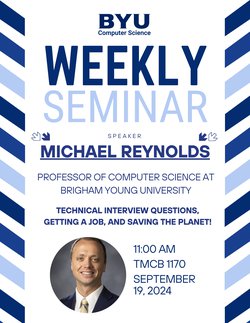
When: September 19th @ 11am
Where: TMCB 1170
Talk Title: Technical interview questions, getting a job, and saving the planet!
We will do some practical training on algorithms and explore space and runtime efficiency. We'll briefly explore what to do to get a job including some resume tips and people tips. Finally, if none of that was interesting to you please come and learn how to write efficient code to reduce your code's impact on the environment! These may all seem unrelated, but come find out why they are one and the same.
September 09, 2024
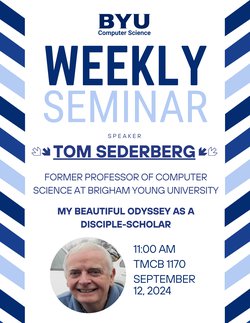
When: September 12th @ 11am
Where: TMCB 1170
Talk Title: My Beautiful Odyssey as a Disciple-Scholar
This talk presents some of what I have learned about being a disciple-scholar during my years at BYU, first as a student and later as a professor.
August 12, 2024
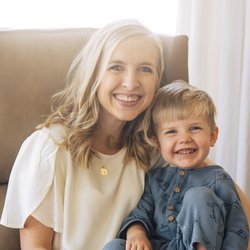
July Alumni Spotlight
"Involve God at every step. Find mentors who believe in you even when you don’t believe in yourself. And it’s ok to want to quit a million times!" Alicia Wood

